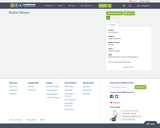
- Subject:
- Higher Education
- Material Type:
- Module
- Author:
- Rachel Meyer
- Date Added:
- 06/07/2016

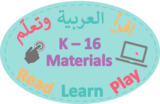
Read, Learn and Play: Online Interactive Arabic Reading Materials provides original reading texts in the form of shareable eBooks and audio books alongside virtual online practice activities that focus on reading, writing, and comprehension building. The materials are designed according to Comprehensible Input (CI) theory and the Teaching Proficiency Through Reading and Storytelling (TPRS) method and are aligned to novice, intermediate and advanced ACTFL proficiency benchmarks and are designed for non-heritage K-16 language learners. This project was created with support from the U.S. Department of Education’s International Research and Studies Program.

Rationale: This activity will provide an alternative to traditional activities on French families offered in a lot of textbooks, and will get students engage with an authentic material: an excerpt from a contemporary Francophone “bande dessinée”. While some students may already know traditional Francophone comics such as Tintin or Astérix, this activity is here to provide them with a more recent and more diverse example. Aya de Yopougon is centered on a young female character growing up in Yop City, a fictional city very similar to writer Marguerite Abouet’s own native city (Abidjan, Ivory Coast). The “reading” phase of this activity is designed to encourage collaborative reading.

Building the capacity to synthesize and to convey meanings from course reading is an essential skill for graduate study. In being a reading leader for a course session, students will demonstrate reading comprehension, presentation, and teamwork skills. Created by Steven Harris-Scott, Ph.D., and Amy Lewis, Ed.D., for INTO George Mason University with support from Mason 4-VA. Attribution-NonCommercial 4.0 International (CC BY-NC 4.0). .
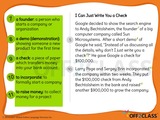
The History of Google – This is one of my favorite reading lessons because I can use it with business students, adults, and kids- it’s a hit with all of them. Students will have the opportunity to read, speak and learn about the history of a search engine most of us use every day.If you want additional lesson plans and support, including teachers’ notes, be sure to register for a free Off2Class account.

Word Count: 10792
(Note: This resource's metadata has been created automatically by reformatting and/or combining the information that the author initially provided as part of a bulk import process.)

A critical inquiry into the politics, practices, and infrastructures of open access and the reconfiguration of scholarly communication in digital societies.
The Open Access Movement proposes to remove price and permission barriers for accessing peer-reviewed research work—to use the power of the internet to duplicate material at an infinitesimal cost-per-copy. In this volume, contributors show that open access does not exist in a technological or policy vacuum; there are complex social, political, cultural, philosophical, and economic implications for opening research through digital technologies. The contributors examine open access from the perspectives of colonial legacies, knowledge frameworks, publics and politics, archives and digital preservation, infrastructures and platforms, and global communities. The contributors consider such topics as the perpetuation of colonial-era inequalities in research production and promulgation; the historical evolution of peer review; the problematic histories and discriminatory politics that shape our choices of what materials to preserve; the idea of scholarship as data; and resistance to the commercialization of platforms. Case studies report on such initiatives as the Making and Knowing Project, which created an openly accessible critical digital edition of a sixteenth-century French manuscript, the role of formats in Bruno Latour's An Inquiry into Modes of Existence, and the Scientific Electronic Library Online (SciELO), a network of more than 1,200 journals from sixteen countries. Taken together, the contributions represent a substantive critical engagement with the politics, practices, infrastructures, and imaginaries of open access, suggesting alternative trajectories, values, and possible futures.

Disclaimer: while this method works, it has several limitations. Using the pro-version of zoom (with cloud record) or opting to local record on a PC or Mac ...

Recurso para el curso: Redacción de informes académicos

This H5P drag and drop activity gives you skills practice in creating reference lists and in-text citations using APA 7th edition.
Arrange text boxes in the correct order to complete the in-text citation and reference list entry.
Test yourself, compete with friends, or simply use the information bubbles to learn the basics.

A reflection journal is designed for students to learn from experiences. This reflective journal focuses on basic concepts of academic development for graduate study and future professional development. Reflective learning requires a systematic review of learning experiences and intentional applications of concepts that are discussed in class. Written reflections require substantial context and connectivity of ideas and thoughts. Each journal entry is a minimum of 350 words and submitted bi-weekly. This reflection journal was designed to compliment course lessons and reiterate course learning objevtices. Created by Steven Harris-Scott, Ph.D., and Amy Lewis, Ed.D., for INTO George Mason University with support from Mason 4-VA.
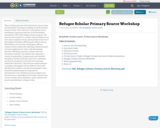
This workshop presents selected primary sources from the
Rockefeller Foundation holdings at the Rockefeller Archive
Center. This collection is intended for use in facilitating a
classroom exercise on the Rockefeller Foundation’s
1933-1945 refugee scholar program. The exercise asks
students to consider what foundations can do in times
of global crisis by placing them in the role of Rockefeller
Foundation (RF) program officers during World War II. As
were the real program officers, students will be tasked with
selecting a limited number of scholar applicants for aid in a
life-threatening situation. Working in groups, students will
read documents related to ten scholars who represent
a variety of nationalities, backgrounds, and scholarly
disciplines. Students will then select four candidates, and
must be prepared to articulate the reasoning behind their
decisions. This exercise enables students to imagine and
grapple with the difficult choices RF officials had to make in
one historical example of how foundation philanthropy has
responded to humanitarian crisis. Students are encouraged
to use this exercise as a springboard for further research
into current scholar rescue initiatives, and/or policies
and practices pertaining to refugees today.
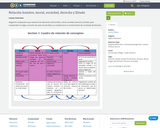
diagrama comparativo que relaciona los elementos del hombre, moral, sociedad, derecho y Estado, para comprender el origen y función de cada uno de ellos y su incidencia en la conformación de un Estado de Derecho.
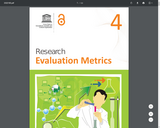
This module dwells on a number of methods (including old and new) available for research evaluation. The module comprises the following four units:
Unit 1. Introduction to Research Evaluation Metrics and Related Indicators.
Unit 2. Innovations in Measuring Science and Scholarship: Analytical Tools and Indicators in Evaluation Scholarship Communications.
Unit 3. Article and Author Level Measurements, and
Unit 4. Online Citation and Reference Management Tools.
Brief overviews of the units are presented below.
Unit 1 encompassed and discussed citation analysis, use of citation-based indicators for research evaluation, common bibliometric indicators, classical bibliometric laws, author level indicators using authors' public profiles, article level metrics using altmetric tools. It is to be noted that author level indicators and article level metrics are new tools for research evaluation. Author level indicators encompasses h index, citations count, i10 index, g index, articles with citation, average citations per article, Eigenfactor score, impact points, and RG score. Article level metrics or altmetrics are based on Twitter, Facebook, Mendeley, CiteULike, and Delicious which have been discussed. All technical terms used in the Unit have been defined.
Unit 2 deals with analytical tools and indicators used in evaluating scholarly communications. The tools covered are The Web of Science, Scopus, Indian Citation Index (ICI), CiteSeerX, Google Scholar and Google Scholar Citations. Among these all the tools except Indian Citation Index (ICI) are international in scope. ICI is not very much known outside India. It is a powerful tool as far Indian scholarly literature is concerned. As Indian journals publish a sizable amount of foreign literature, the tool will be useful for foreign countries as well. The analytical products with journal performance metrics Journal Citation Reports (JCR®) has also been described. In the chapter titled New Platforms for Evaluating Scholarly Communications three websites i.e. SCImago Journal & Country Rank (SJR) [ScimagoJR.com], eigenFACTOR.org, JournalMetrics.com and one software called Publish or Perish (POP) Software have been discussed.
Article and author level measurements have been discussed in Unit 3. Author and researcher identifiers are absolutely essential for searching databases in the WWW because a name like D Singh can harbour a number of names such as Dan Singh, Dhan Singh, Dhyan Singh, Darbara Singh, Daulat Singh, Durlabh Singh and more. The ResearcherID.com, launched by Thomson Reuters, is a web-based global registry of authors and researchers that individualises each and every name. Open Researcher and Contributor ID (ORCID) is also a registry that uniquely identifies an author or researcher. Both have been discussed in this Unit. Article Level Metrics (Altmetrics) has been treated in this Unit with the discussion as to how altmetrics can be measured with Altmetric.com and ImpactStory.org. Altmetrics for Online Journals has also been touched. There are a number of academic social networks of which ResearchGate.net, Academia.edu, GetCited.org, etc. have been discussed. Regional journal networks with bibliometric indicators are also in existence. Two networks of this type such as SciELO – Scientific Electronic Library Online, and Redalyc have been dealt with.
The last unit (Unit 4) is on online citation and reference management tools. The tools discussed are Mendeley, CiteULike, Zotero, Google Scholar Library, and EndNote Basic. The features of all the management tools have been discussed with figures, tables, and text boxes.
This is Module Four of the UNESCO's Open Access Curriculum for Researchers.
Full-Text is available at http://unesdoc.unesco.org/images/0023/002322/232210E.pdf
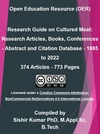
This Book is a Open Education Resource (OER) and is Research Guide on Cultured Meat providing the details of Research Articles, Books, Conferences along with Abstract and Citation Database from the time period of 1985 to 2022.This study resource is a unique resource to gain deeper understanding of research and development relating to cultured meat sector.
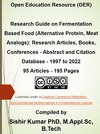
This Book is an Open Education Resource (OER) and is Research Guide on Fermentation Based Food relating to Alternative Protein and Meat analogs or Meat alternatives, providing the details of Research Articles, Books, Conferences along with Abstract and Citation Database from the time period of 1997 to 2022.This study resource is a unique resource to gain deeper understanding of research and development relating to Fermentation Based Food relating to Alternative Protein and Meat alternatives.
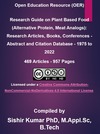
This Book is an Open Education Resource (OER) and is Research Guide on Plant Based Food relating to Alternative Protein and Meat analogs or Meat alternatives, providing the details of Research Articles, Books, Conferences along with Abstract and Citation Database from the time period of 1975 to 2022.This study resource is a unique resource to gain deeper understanding of research and development relating to Plant Based Food relating to Alternative Protein and Meat alternatives.
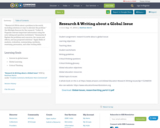
* Research & Write about a problem in the world, including solutions or ways to alleviate the problem
* Use Multiple Sources for the research
* Collect & Organize relevant important information using the note-taking and question worksheets
* Summarize & Explain the problems and concerns,
the causes and effects, and any proposed solutions
* Apply Skills of analysis, evaluation, summarizing, synthesis, reasoning, persuasion, and other writing skills

Short Description:
These modules are for academic and higher degree researchers who want to develop and extend the skills required in the contemporary research environment. (This set of modules is under development - check back regularly to find additional content.)
Long Description:
Research and Writing Skills for Academic and Graduate Researchers is for higher degree students and academics who want to develop skills to assist them on their research journey, from the beginning stages of searching the literature and developing a research proposal, to writing and presentation skills, and on to managing their researcher profile and finding evidence of their research impact.
While written with RMIT University higher degree and academic researchers in mind, other researchers world-wide may find it applicable – feel free to adopt or adapt to suit your own context.
This set of modules is under development – check back regularly to find additional content.
Word Count: 27295
(Note: This resource's metadata has been created automatically by reformatting and/or combining the information that the author initially provided as part of a bulk import process.)

Practical Teaching Strategies to Overcome Distance, Disruption, and Distraction
Short Description:
Resilient Pedagogy offers a comprehensive collection on the topics and issues surrounding resilient pedagogy framed in the context of the COVID-19 pandemic and the social justice movements that have swept the globe. As a collection, Resilient Pedagogy is a multi-disciplinary and multi-perspective response to actions taken in different classrooms, across different institution types, and from individuals in different institutional roles with the purpose of allowing readers to explore the topics to improve their own teaching practice and support their own students through distance, disruption, and distraction.
Long Description:
Faculty and staff in higher education have seen first-hand how distance, disruption, and distraction can challenge our perceptions of teaching and learning while highlighting inequities across our colleges and universities. As the first book in the Empower Teaching Open Access Book Series, the editors of Resilient Pedagogy asked authors to explore the concepts surrounding resilient pedagogy in the context of the COVID-19 pandemic and the social justice movements that impacted higher education in myriad ways, and provide practical strategies to better support students across contexts.
The purpose of this collection was not for authors to create a new definition for the term resilient pedagogy, nor to be provide a singular perspective. Instead, authors in each of the 15 chapters were asked to reflect on the emerging implications of year spent in turmoil and to connect their experiences to the literature and scholarship of teaching and learning. Many of the negative aspects surrounding distance, disruption, and distraction weren’t caused by the pandemic, but our collective experience made us keenly aware of the inequities and throughout this volume the authors call readers to action to address these inequities head on.
Readers are invited to take the concepts, strategies, and ideas presented in this volume and find ways to apply them to their own contexts. Thanks to the open access nature of the collection readers can share the insights on Twitter by tagging @ResiPed and using #ResilientPedagogy to build upon the work of the authors and continue to engage in the discourse and the work of Resilient Pedagogy.
Word Count: 112688
(Note: This resource's metadata has been created automatically by reformatting and/or combining the information that the author initially provided as part of a bulk import process.)